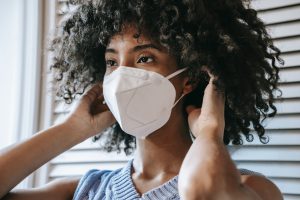Chronic Disease and COVID-19
For many Americans, healthy lifestyles are important for the proper management of chronic conditions such as overweight/obesity, hypertension (high blood pressure), and type 2 diabetes (sugar/diabetes). However, many of us struggle with the time and resources needed to meet the daily demands of the various roles we carry such as significant other, parent, caregiver, and employee or entrepreneur. The COVID-19 pandemic has highlighted the importance of making health a priority, especially for those with chronic conditions. Chronic conditions have been found to increase the risk of severe illness from COVID-19 and are very common in our state.
- About 37% of Floridians have obesity, with rates being even higher among rural communities and African Americans (Filipp et al., 2018, https://onlinelibrary.wiley.com/doi/full/10.1002/osp4.274).
- About 49% of Floridians have hypertension (CDC, 2018)
- Approximately 12% of adults in Florida have diabetes (American Diabetes Association, 2020)
In addition to these common chronic conditions, some other health conditions are known to cause more severe illnesses from COVID-19.
They are:

- Cancer
- Kidney, liver, or lung disease
- Dementia
- Down syndrome
- Heart conditions
- HIV
- Mental health or substance use disorders
- Sickle cell disease
- Solid organ or blood stem cell transplant or other immunosuppressed condition
- Stroke
- Tuberculosis
- Current or former smoker
- Pregnancy
Chronic conditions can make people more likely to get severely ill, so it is important that we take preventive measures like eating healthy, engaging in regular exercise, getting sufficient sleep, and managing stress. We should also follow CDC recommendations for preventing COVID-19,
such as:

- Wearing a mask
- Practicing physical distancing
- Avoiding crowds and poorly ventilated spaces
- Cleaning our hands often, either with soap and water for 20 seconds or a hand sanitizer with at least 60% alcohol
- Getting vaccinated
The key to our overall health will depend on us achieving, maintaining, and finding time to care for ourselves. If we take extra care and caution during COVID-19 and beyond, we can keep ourselves, our loved ones, and others in our community safe.
The Live COVID SMART blog series was developed to promote resilience in response to the COVID-19 pandemic. Contributing authors: Austin Edwards, Marcia Brown, Kim Griffin, Beth Kerr, Lori Wiggins, Heidi Radunovich, John Diaz, and LaToya J. O’Neal. This work is supported by the Rural Health and Safety Education Program [grant no. 2021-46100-35459].
References
Centers for Disease Control and Prevention. (2018, March 1). Hypertension in Florida: Data from the OneFlorida Clinical Data Research Network. Retrieved on November 20, 2021. https://www.cdc.gov/Pcd/issues/2018/17_0332.htm
Florida Department of Health. (2022, January 22). Healthy weight. Retrieved on January 31, 2022. https://www.floridahealth.gov/programs-and-services/prevention/healthy-weight/index.html
American Diabetes Association. (2020, February). The burden of diabetes in Florida. Retrieved on January 31, 2022. http://main.diabetes.org/dorg/docs/state-fact-sheets/ADV_2020_State_Fact_sheets_FL.pdf
U.S. Department of Agriculture Economic Research Service. (2021, July 12). The COVID-19 pandemic and rural America. Retrieved on November 17, 2021. https://www.ers.usda.gov/covid-19/rural-america/
Covid Act Now Coalition. (2022, January 31). U.S. covid risk & vaccine tracker. Retrieved on November 17, 2021. https://www.covidactnow.org/
 0
0
